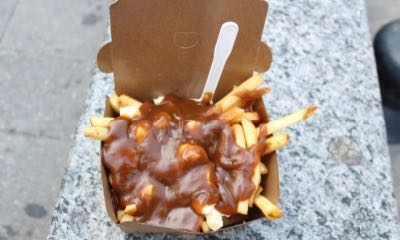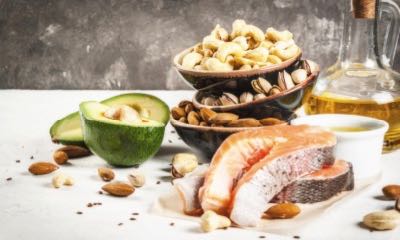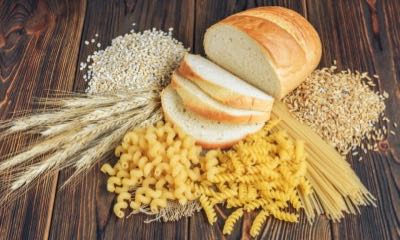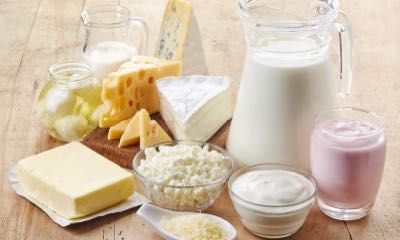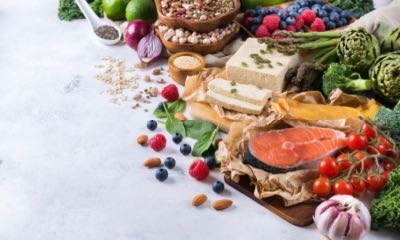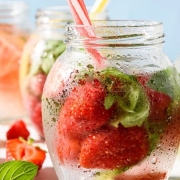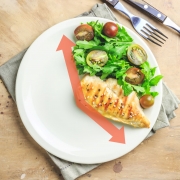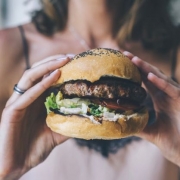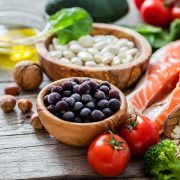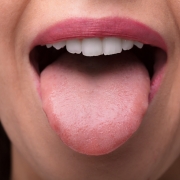Lighten Up—Ditch These Foods That Weigh You Down
There’s nothing worse than turning to a comfort food only to be plagued with a bellyache. Bloating and discomfort are hallmarks of indigestion. And poor choices of foods that weigh you down can turn lunchtime excitement into an afternoon of feeling heavy and tired.
That icky, uncomfortable feeling you get after overindulging in unhealthy foods goes by many names. Indigestion is an umbrella term that encompasses the bloated, gassy, sluggish, and heavy sensations that follow a meal that’s gone too far.
It’s not just overeating that leads to indigestion, though. Certain foods can trigger stomach upset more than others—you’ll read about some soon. A well-balanced meal with appropriate portions is easily digested. But when simple carbs or saturated fats dominate your plate, you can almost count on needing to loosen your belt.
An unhealthy diet can leave your body feeling worn out and weary. But positive changes and healthy choices can put the spring back in your step. Lots of foods can stall your digestion. Good thing there are just as many options that fill you up without weighing you down.
First, let’s highlight some of the common sources of bellyache and the foods that weigh you down. You’ll start with some of the obvious bad actors. And then follow up with hidden sources of feeling “ugh” after eating. Remember, too much of any food can lead to gastrointestinal upset that sinks your day and leaves you feeling heavy.
The Heft of High-Fat Foods
This might be a no-brainer. But foods with a high fat content definitely weigh you down.
Foods with lots of saturated fat tend to be very rich and can leave you feeling uncomfortably full. Fat (saturated and trans) is often added to foods to boost taste. But all that flavor comes at a price.
Fatty foods are usually low in fiber. This is a problem because fiber is great for digestion. It adds bulk to stool and pushes it through the digestive system. High-fat diets are often accompanied by constipation. Without fiber to aid in digestion, fatty foods leave your gut feeling heavy.
Fried foods are especially hard on your body. They lack fiber and they are low in the essential nutrients, vitamins, and minerals that help you maintain your energy. It’s hard to fight off sluggishness and sloth when using fried, often heavily fatty, foods for fuel.
Alternative: Unsaturated, Healthy Fats
It’s impossible to practice healthy eating without having fat in your diet. It’s an essential macronutrient. But not all fats are created equal. Watch out for too much saturated fat in your diet and do your best to avoid trans fats. Instead, focus on healthy unsaturated fats (mono and poly) as part of a balanced diet.
Examples of foods high in unsaturated fats include: avocado, olive oil, nuts, and fish. These foods are nutrient-rich and contain fats that support healthy brain function. Swap out some of your high-saturated-fat foods with a healthy fat instead.
Processed Grains
When lunch rolls around, the last thing you want to fill up on are processed grains. You’ll find them hiding in white bread, white rice, and pasta. These carbs are notorious for dumping sugar into the bloodstream and creating crashes shortly after.
Refined grains are missing key components like bran and germ. Bran supplies fiber, which stabilizes energy for hours after a meal. With bran missing from the equation, an energy slump is bound to follow a meal of processed grains.
Foods like white bread are also lacking in germ. This part of the grain is rich in B vitamins. Your body utilizes B vitamins to harness energy from the food you eat.
If you eat too much processed grain, so much for lunch fueling a productive afternoon. You might need a nap instead.
Alternative: Whole Grains
A simple solution to fatigue brought on by processed grains is to switch them out for their whole grain counterparts. Whole grains are a much healthier option when building a meal.
That’s because whole grains are high in fiber. So, they steadily release energy and help you avoid sugar highs and crashes. Fiber also helps the waste products from digestion travel through your gut. With reliable energy and a happy tummy, whole grains are an important part of a healthy meal and diet.
Don’t settle for the sleepiness and stomach discomfort brought on by processed, refined grains. Put whole grains on the menu instead. Look for whole-wheat bread, cereal, brown rice, and whole-grain pasta to round out your diet.
Low-Calorie Foods Can Lead to Feeling Heavy
It’s hard to believe that low-calorie foods aren’t always the best choice when you need a snack. Calories are your body’s energy currency. And you need to keep calories moving in to have the energy you need to accomplish tasks.
The problem arises when too many of these low-calorie options are used throughout the day. Insufficient calorie intake will leave your body feeling sapped of energy. It’s difficult to get work done when your fuel tank is on empty. And, often these snacks are prepackaged, processed foods with little nutritional value. So, it’s a double whammy for your body.
Restricted calorie consumption can also backfire. And it can drive you to eat more than you should at your next meal. Then the cycle of feeling bad continues because overeating brings on sluggishness and bloat. And the extra food can literally weigh you down. That’s because quieting excessive hunger with an extra-large meal may also lead to weight gain.
Changes to metabolism and hormonal balance may also occur if calorie restriction becomes a habit. These metabolic changes make it hard to maintain a healthy weight. And hormonal shifts may trigger lowered mood and decreased sense of well-being.
Alternative: Healthy Snacks in Proper Portions
Overindulgence in any food has the potential to lead to weight gain. But opting for low-calorie foods over a healthy snack can produce the same result. When choosing something to tide you over ‘til the next meal, avoid labels like: low-cal, lite, and zero calorie.
Choose naturally low-calorie snacks like berries, melon, and cucumber. These will fill you up and provide your body with much needed vitamins and minerals.
If you’re worried about calorie intake, look for hidden sources of calories. Carbonated beverages, alcohol, and juice are all loaded with calories. These drinks don’t satisfy hunger. Drink water instead, and eat wholesome, healthy foods to fill your daily calorie requirements.
Carbonated Beverages Don’t Always Lift You
If you’re feeling gassy and bloated after eating, your choice of beverage might be to blame. Carbonated beverages like soda are popular. But these fizzy drinks don’t stop bubbling after the first sip. They create gas long after you swallow. And while they don’t leave you feeling heavy, they don’t have a desirable after-effect either.
First, let’s go over what gives carbonated beverages their characteristic bubbles. Fizzy drinks contain large amounts of carbon dioxide, a gas. These gas bubbles pop in your digestive tract. So, the fun fizz in your drink translates to gas and bloat in your belly.
Another source of gas from carbonated beverages is the sweetener. Diet drinks have sugar substitutes that taste sweet like the real thing. But your body knows the difference and these substitute sweeteners can be tough to digest.
Limit food and drinks containing sugar alcohols like sorbitol, xylitol, and mannitol. These sugar substitutes travel all the way to the large intestine before breakdown begins. Gas can be a result of this fermentation and digestion. So, you don’t have to totally avoid these sugar alcohols. But reach for them in moderation.
Bloating and gas are sure-fire ways to feel off your game. It’s hard to get comfortable when you feel puffy and heavy.
Alternative: Water, Water, Water!
Eliminate extra gas from your diet by drinking water. Water is your body’s beverage of choice and is free of bubbles and sweeteners that upset your stomach later.
If flavor is what you’re looking for in a bubbly drink, try infusing your water with natural ingredients. You can achieve the desired taste with sliced lemon, lime, berries, and cucumber. Get creative and add herbs, too. Basil, rosemary, and mint are popular options. Herbal tea can also be a good, non-caffeinated option.
Skip carbonated water, too. Even without the added sugar, this fizzy drink can cause intestinal discomfort. Instead, drink water in its purest form. Straight up, on the rocks, or with a squeeze of lemon—you’re making the healthy choice by sticking to H2O.
Dairy Can Do Your Day In
Occasionally, a trip down the dairy aisle will sink your day, or—worse yet—send you running for the bathroom. That’s because lactose (a sugar found in most dairy products) can be difficult for your gut to digest.
The main offender is usually milk. Cow’s milk is high in lactose and can cause painful gas and diarrhea in people who lack the digestive enzyme lactase. If your body struggles to digest lactose, you probably already know about it. As much as 65 percent of the global population struggles to digest lactose.
Bloat and fatigue usually follow a bout with lactose. And this reaction to lactose makes it hard for your body to absorb the nutrition that milk has to offer. Remember, milk is high in bone-strengthening calcium. How can you get the good stuff from dairy and avoid stomach upset and feeling heavy?
Alternative: Yogurt, Cheese, and Other Fermented Dairy Products
Cue fermented dairy. Some of your favorite dairy products have already begun the breakdown of lactose. Yogurt and kefir are made with enzymes that tackle the lactose in milk before it gets to your gut. These alternatives are great sources of calcium and probiotics that further aid in digestion.
If you’re looking for a milk substitute, try almond milk. This and other nut milks may be easier on your digestive system. They are packed with good stuff like calcium and vitamin D. And they taste great, too.
Should your sensitivity to lactose be especially strong, consult with a healthcare provider. They will know the best ways for you to get the calcium you need without compromising your comfort.
Swap It Out
Now you know the foods that weigh you down (and beverages, too), so be proactive and switch them out of your diet. Substitute heavy foods for a fiber-filled option. Balance your plate with whole grains and a variety of food groups. Challenge yourself to drink more water. (And when you think you’ve drunk enough H2O, pour yourself another glass.)
Look for alternatives to the foods that leave you feeling heavy and keep you from being at your best. Limit or skip the items in the left column and snack on the healthier options from the right:
Weigh You Down
Fried food
Pre-packaged pastries
Trans fats
Red meat
White bread
Pasta
Low-cal ____
Diet ____
Soda
Ice cream
Lift You Up
Avocado
Olive oil
Fatty fish
Roasted veggies
Lean protein
Whole wheat bread
Brown rice
Nuts
Berries
Melon
Cucumber
Infused water
Greek yogurt
About the Author
Sydney Sprouse is a freelance science writer based out of Forest Grove, Oregon. She holds a bachelor of science in human biology from Utah State University, where she worked as an undergraduate researcher and writing fellow. Sydney is a lifelong student of science and makes it her goal to translate current scientific research as effectively as possible. She writes with particular interest in human biology, health, and nutrition.
References
https://www.bustle.com/articles/143666-6-foods-that-slow-you-down-both-physically-and-mentally
https://ghr.nlm.nih.gov/condition/lactose-intolerance
https://www.healthline.com/nutrition/8-foods-that-cause-constipation
https://www.healthline.com/nutrition/13-foods-that-cause-bloating
https://www.healthline.com/nutrition/foods-that-drain-energy
https://www.healthline.com/health/heaviness-in-stomach
https://medlineplus.gov/bvitamins.html
https://www.ncbi.nlm.nih.gov/pubmed/26841435
https://www.ncbi.nlm.nih.gov/pubmed/28530498
https://www.ncbi.nlm.nih.gov/pubmed/26176421
https://www.webmd.com/digestive-disorders/features/bloated-bloating#2




